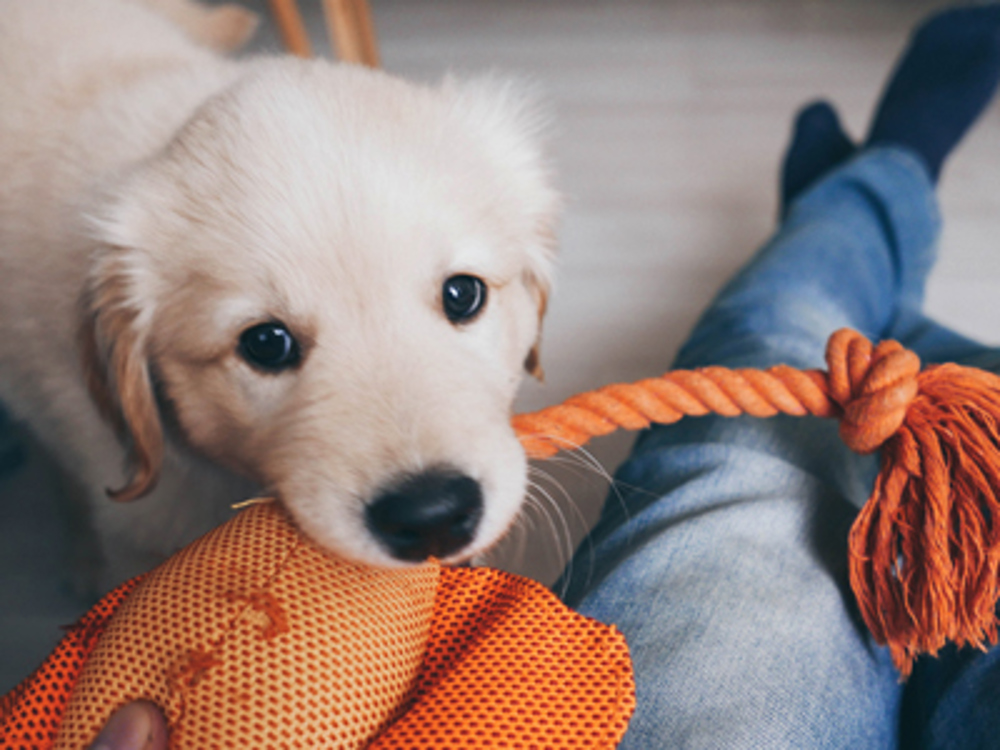
Weeks 9–12 of your puppy's life are all about helping them to discover the world, but in a safe way.
This is a difficult period for new puppy owners. On the one hand, you need to spend as much time as possible socialising your puppy to their new life, but on the other hand, at this age, they are not yet fully vaccinated. It is a bit of a balancing act, but the benefits of socialisation are too important to ignore!
Your puppy’s vaccination status doesn't stop you taking them out and about – they just need to be carried and should only meet dogs whose vaccination status you are 100% sure about. It also doesn’t stop you inviting people to come and meet them at your home or in the garden. They can also go out in the car and can be carried around town.
Advice on socialising your puppy
Read your checklist
In the first four weeks, try and make sure your puppy meets everything on your socialisation and habituation checklist at least three times.
These experiences need to be totally positive – so if it's a person, they should give the puppy a treat, and if it is an experience (car, traffic, pub etc.) you need to make sure you treat and reward the puppy in that environment by playing a game with them or feeding them their dinner there.
Socialising a young puppy is easy – as most people you meet will want to see them and will be happy to help. After all, who can resist a cute puppy?
Interact using toys
Use interactive toys stuffed with food, give them problems to solve, and controlled frustration to deal with. To continue their brain development in their new home, introduce them to tunnels, steps, things to clamber over and different surfaces to walk on.
Teach them about separation
Teach your puppy that part of their new life includes being left alone for short periods of time – or not having constant access to you. Do this from the first day you bring them home. Use a dog crate or a baby gate to separate them from you at least once every day at times when there are positive things happening, like eating dinner. To start with, they should still be able to see you, and so not feel deserted.
Introduce friendly dogs
If you know any, introduce them to friendly, healthy, vaccinated dogs. If not, speak to your veterinary practice or your chosen puppy training class; some have days where your pup can meet friendly staff dogs in a safe environment.
Encourage them to follow you
Encourage your pup to follow you by rewarding them with a treat or a game when they do. This means keeping a constant supply of treats in your pocket. This will simplify recall training when your puppy is older and will build the bond between you.
Teach relaxation
Teach your puppy about relaxation and being calm around you. This includes when being groomed and being handled around their feet, face, mouth and ears. You can do this by rewarding them when they are still and relaxed.
Many owners miss this one in all the excitement and so the dog thinks everything is a game and never keeps still when the owner is around.
Encourage periods of quiet time
Encourage quiet when your pup is relaxed and settles down in your presence. Start these as very short periods, using a crate or a play pen beside you if necessary and giving your puppy something to occupy them, such as an interactive toy.
As your puppy grows, the attention and training they need starts to change too.
Don't forget the rest!
There are also some other really important factors that you need to consider as your dog gets older.
These are:
- immunisations (for more information see the WSAVA guidelines) and when it is safe to start taking your puppy out for walks
- training
- feeding and nutrition
- worming
- permanent identification, e.g. microchipping, if not already done by the breeder
- neutering
Breed and type considerations
Depending on which breed you choose, you may find that you have to pay more attention to certain things.
Here are some starting points to help you:
- Toy/companion breeds: are more prone to separation anxieties. Spend more time making sure they are happy being left alone both when you are in the house and then when you leave
- Working breeds: spend lots of time making sure they are well-socialised to other dogs and strange people/visitors, and that their natural working instincts are utilised and appropriately channelled into toys and games
- Hounds: try and encourage them to pay attention to you when there are interesting smells or small animals around. Work hard on recall and following you
- Pastoral/herding breeds: make sure that you provide them with plenty of mental stimulation, and have things to occupy their minds so they don't go chasing or herding things
- Terriers: use toys, games and yummy treats to distract them from small or fast moving animals and to prevent them ignoring you
Consider what the breed was originally bred to do – this will give you clues to what you need to socialise for. For more information, refer to our Breeds A to Z section.
Insurance
Even if you decide not to have health insurance for your dog, it is a good idea to have third-party liability insurance, as accidents can happen even with the most well-behaved of dogs. You can easily find yourself liable for compensation or any financial claims made in connection with any damage or injury caused by your dog.
